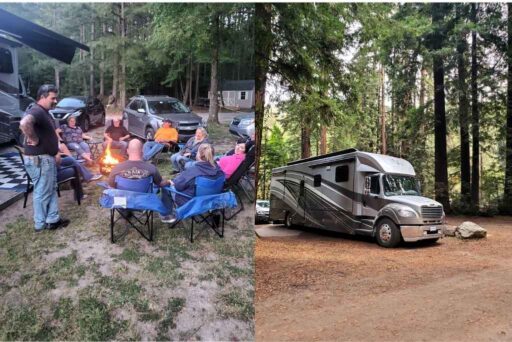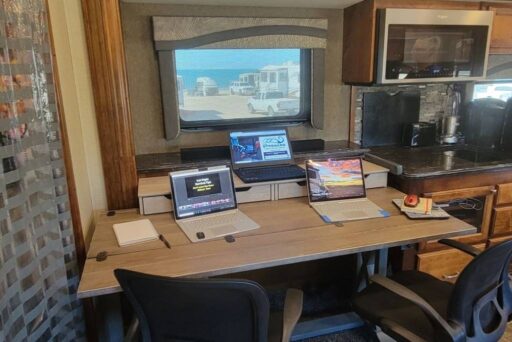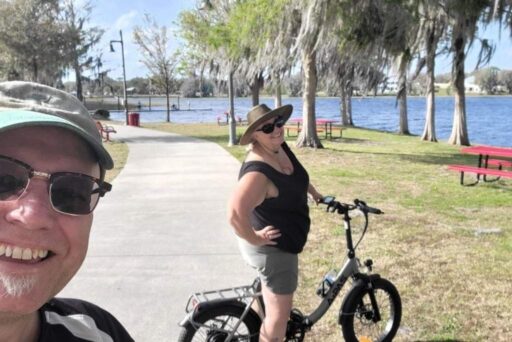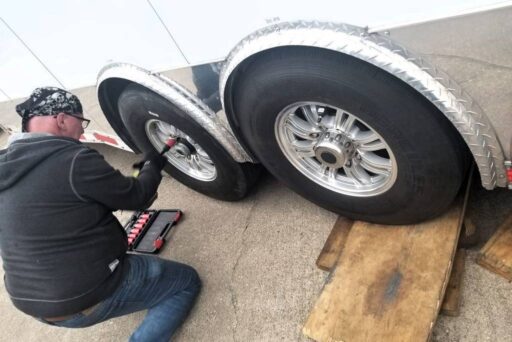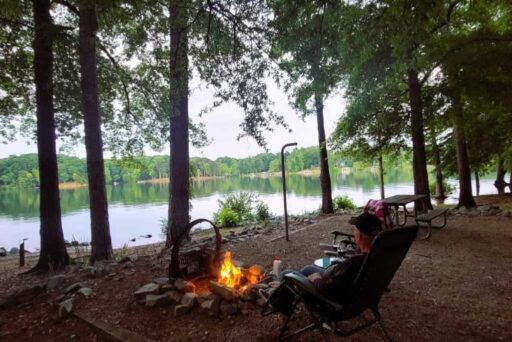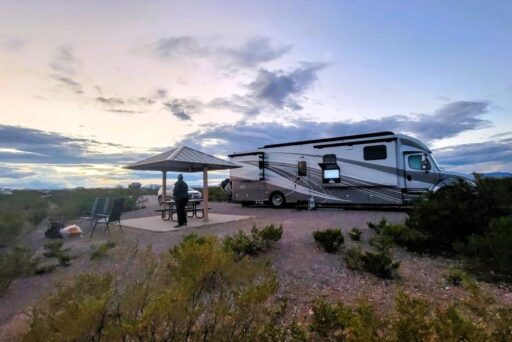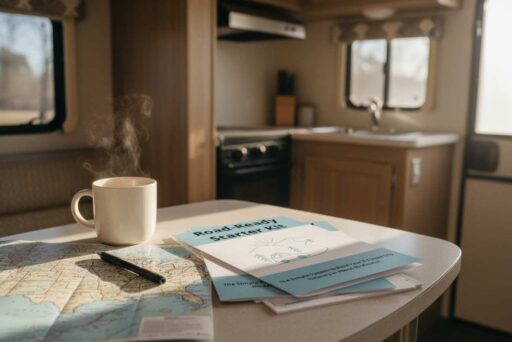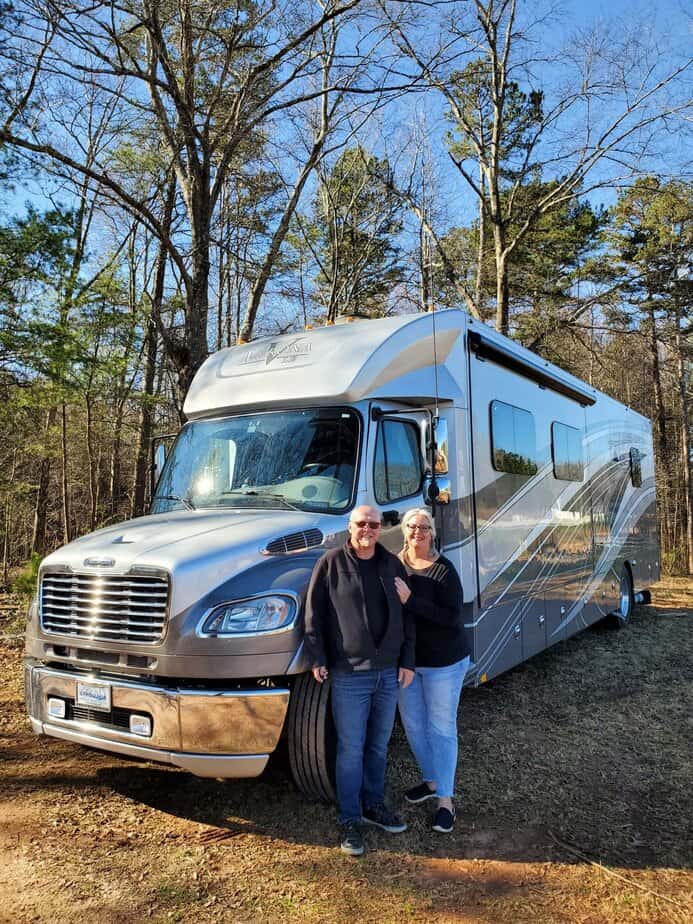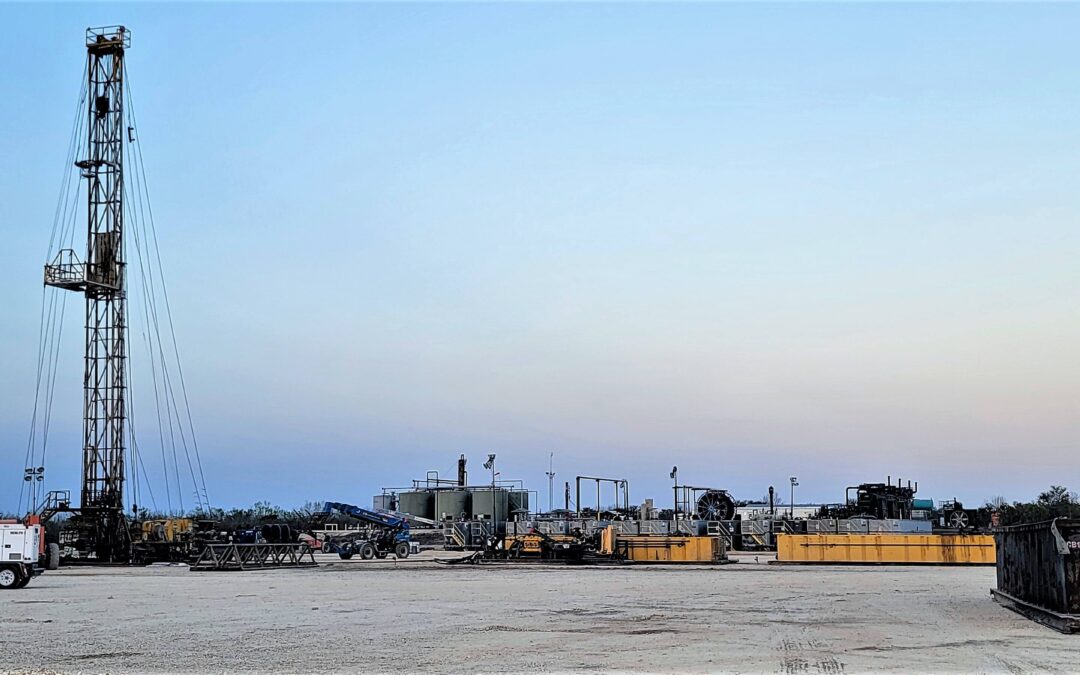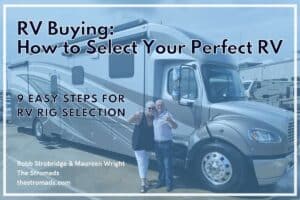Why We Ditched the House and Hit the Road — and How You Can Too
RV living sounds like the ultimate dream — but how do you actually make it work without blowing your budget or losing your mind?
That’s the same question Robb and I asked back in 2016. After years of traveling part-time for work, juggling hotels and Airbnbs, we decided to sell our house and fully embrace life on the road. What started as an experiment turned into the lifestyle we’d been craving for decades: simpler, freer, and more intentional.
Today, after years of full-time RV living, we’ve learned what really matters, from choosing the right rig to staying on budget, staying connected, and keeping your sanity while traveling.
Is Full-Time RV Living
Right for You?
That’s the heart of this guide.
If you’ve ever wondered what it really takes to live full-time on the road, not just the highlight reel, but the day-to-day logistics, budget realities, and relationship shifts, you’re in the right place.
This isn’t theory. It’s what we’ve lived every day for nearly a decade. And in this guide, we’ll walk you through the key decisions, trade-offs, and tools that helped us turn our RV dream into a sustainable reality.
Whether you’re just curious, actively planning, or already downsizing your life, we share everything we wish we’d known before we hit the road.
Choosing Your RV Lifestyle
RV living isn’t one-size-fits-all, and that’s part of what makes it so freeing. But it also means you have to choose what kind of lifestyle actually fits you. Do you want to travel year-round or seasonally? Go solo or take the whole family? Downsize completely or keep a home base?
These aren’t just logistical decisions; they shape your day-to-day experience on the road.
Here are the biggest questions most people ask themselves when they start dreaming about RV life:
- Do I really want to sell my house, or keep a home base?
- Can I live in a small space with my spouse, kids, or even alone?
- Will I feel isolated without friends and familiar routines?
- What if I try it and hate it?
The good news is that there’s no single “right” way to RV. The best lifestyle is built around your goals, not someone else’s Instagram feed.
Full-Time RV Living vs. Seasonal Travel
When choosing your RV lifestyle, one of the first big decisions is whether to go all-in or part-time. Here’s what to expect from both options:
Full-Time RV Living
Your RV is your only home. Everything you own fits inside, and you’re always on the move. It’s full freedom but comes with trade-offs like trip planning, fuel costs, and adjusting to life without a permanent address.
Seasonal Travel
Some travelers split their time, RVing during certain months and returning to a house when the season ends. This approach gives you flexibility without giving up stability.
Solo, Couple, or Family RV Living
Who you travel with shapes your RV lifestyle more than almost anything else. Whether setting out alone, with a partner, or with kids in tow, each setup brings joys and challenges. There’s no perfect formula — just the one that fits your current season of life.
Solo Travel
Offers total independence, but staying socially connected takes intention.
Couple Travel
Living together in a few hundred square feet means learning patience, boundaries, and communication — fast.
Family Travel
Creates unforgettable memories, but demands creativity for schooling, personal space, and balancing everyone’s needs.
👉 ProTip: Before jumping in full-time, rent an RV for a few weeks. In that short time, you will learn more about tight spaces, flexible routines, and daily logistics than from months of research. Try a short trip with Outdoorsy or browse Moterra Campervan Rentals to see what fits your style.
Need help planning your first rental? Download our free RV Rental Guide
— based on our own experience — including what to pack, how to choose the right model, and common rookie mistakes to avoid.
Bottom Line:
No matter which path you choose, part-time, full-time, solo, or with a crew, what matters most is that it fits your life, not anyone else’s. We’ve met RVers who follow the sun year-round, those who only travel summers, and others who keep a tiny home base to return to. There’s no right or wrong, just what works for you.
Our Experience
We didn’t jump into an RV right away. After selling our home, we spent nearly a year living in hotels and Airbnbs. Eventually, we bought our first rig — not because we wanted to live smaller, but because we wanted to live better. That shift gave us the balance of freedom and stability we’d been craving.
In the early days, our kids traveled with us during summers, and we’d return home for the school year. Now, as empty nesters, we’ve found a way of living that works for us as a couple — knowing when to share space and when to give each other room. It hasn’t always been easy, but it’s been worth it.
Can You Actually Afford
Full-Time RV Living?
One of the first realities of full-time RV living is that it’s not a vacation; it’s your life. And life comes with budgets, bills, and the daily math of how to make your money work. A lot of people assume RVing must be cheaper than a house, but the truth is: it depends.
Common Budget Questions:
- How much does full-time RV living actually cost each month?
- Is it cheaper than owning or renting a home?
- When prices change constantly, how do you budget for fuel, campgrounds, and repairs?
- What about insurance, groceries, and all the little things that add up?
The answer? RV life can cost less, the same, or even more than traditional living; it all comes down to your travel style and lifestyle choices. How fast you move, where you stay, and the rig you drive will shape your budget more than anything else.
Monthly Costs: A Realistic Breakdown
These are the most common monthly expenses for full-time RVers. How much you spend depends entirely on your pace, preferences, and priorities.
Campgrounds & Parking
This is one of the biggest wild cards in your budget. Some RVers boondock on BLM land or camp in national forests for free, while others spend $1,500+ a month at resort-style RV parks with pools and full hookups.
Fuel
How often you move matters more than your MPG. If you drive cross-country every month, fuel could hit $1,000/month. But it drops dramatically if you slow down and explore one region at a time. We’ve learned to factor in not just gas prices but also driving style, route planning, and even wind conditions, all of which affect our fuel mileage.
Groceries & Dining Out
Surprisingly, this hasn’t changed much from our house-dwelling days. We spend around $600–$1,000/month for two people, depending on how often we eat out. One tip? Cooking in the RV isn’t as hard as it sounds, and the savings add up quickly. We batch cook when possible and treat restaurant meals as intentional splurges, not the default.
Insurance
This includes coverage for your RV and your tow vehicle, and it varies widely by state, rig size, and policy type. When we switched to full-time living, we had to adjust our policy to account for living in the rig — not just vacationing. It’s worth getting quotes from RV-specific insurance providers who understand mobile life.
Maintenance & Repairs
Even a newer rig needs constant TLC. We budget $400–$600/month for upkeep — oil changes, tire checks, small fixes — and that doesn’t include surprise breakdowns. Preventative maintenance saves money in the long run, so we schedule checkups regularly and keep a buffer fund just in case.
Connectivity
WiFi at campgrounds is unreliable, especially if you work from the road. We pay up to $400/month for a mix of cell plans, hotspots, and a signal booster. It’s a non-negotiable for us, since we run our business online. You might get by on less if you’re using it for streaming and browsing.
Miscellaneous
This is your catch-all for laundry, entertainment, tolls, and spontaneous spending. It doesn’t seem like much, but it adds up fast. We set aside a few hundred dollars monthly for things like museums, parking, and winery stops in random towns.
Tips for Saving Money on the Road
- Travel slowly — less driving means lower fuel and discounted longer stays
- Mix in free or low-cost camping (BLM land, state parks, membership deals)
- Cook most meals in your rig instead of eating out
- Use campground memberships (like Thousand Trails or Passport America)
- Budget for maintenance before breakdowns happen; surprises get expensive fast
👉 ProTip: Budgeting looks different for everyone, and numbers shift depending on how often you move and where you stay. To help you run your own numbers, we created a simple tool.
Download our Full-Time RV Living Budget Guide to plug in your fuel, campground, grocery, and other monthly costs. It’s a great way to visualize your expenses before you hit the road.
Our Experience
Because of our contracts in the fair and festival industry, we often stay on fairgrounds at no cost, and in some side gigs we’ve even been paid to camp at resorts. When we do pay out-of-pocket, we prefer state parks over private resorts — they’re cheaper, quieter, and give us everything we need without the extras.
Fuel is one of our biggest expenses, but we’ve learned how to manage it. The Open Roads discount card has saved us up to $1 per gallon of diesel, and keeping our speed between 65–72 mph has noticeably improved mileage.
Those small habits add up fast and help us keep our budget in line without sacrificing freedom.
What a Typical Day Really Looks Like in an RV
Full-time RV living isn’t a never-ending vacation; it’s real life, just on wheels. You still have to cook meals, do laundry, make a living, and occasionally stare at a pile of dirty dishes while parked in a stunning national park.
Many people imagine constant adventure, but the truth is: you have to balance the ordinary with the extraordinary. What makes it different is that you choose the backdrop.
Common Questions About RV Life
- What does a “normal” day look like in an RV?
- How do you stay connected with friends and family?
- What about internet access for work, streaming, or school?
- How do you handle cooking, laundry, and finding personal space?
- Can you actually get bored living on the road?
The reality? Life on the road is exactly what you make it. Some days are filled with hikes and sunsets. Others are filled with grocery runs, engine checks, and work deadlines. The magic is choosing a pace that fits your lifestyle, not someone else’s travel reel.
Avoiding Burnout and “Over-Traveling”
One of the biggest mistakes new RVers make is trying to see it all, fast. We’ve watched people hit the road and immediately start racing coast to coast, checking off every park and overlook like it’s a to-do list. The result? Total burnout within a few months.
The solution: Slow down. Stay in one place for a week or two. It saves fuel, lets you explore deeply, and gives your mind and body space to rest. You don’t have to see it all in your first year: the road will still be there tomorrow.
Staying Connected with Friends and Family
Just because you’re moving doesn’t mean you have to feel disconnected. Technology makes it easier than ever to stay in touch from anywhere.
We’ve celebrated birthdays over FaceTime from campsites, joined Zoom calls from picnic tables, and met up with friends when our routes crossed paths.
👉 ProTip: Schedule connection intentionally, just like you’d plan a campground or hike. It makes a big difference emotionally.
Creating Daily Routines on the Road
Structure doesn’t vanish just because your home has wheels. In fact, routine is what keeps RV life sustainable. Whether you’re working, homeschooling, or retired, finding a rhythm helps balance freedom with function.
Our Groove (and how we found it)
While planning a big California trip, Robb looked at the map and asked, “Do we really need more than four nights there? What could we possibly do?” Spoiler: four nights wasn’t nearly enough. That trip showed us the magic of slow travel: sometimes the best experiences only happen when you stop rushing.
The same lesson carried over during COVID, when I started a virtual book club to stay connected. We still meet once a month, no matter where I’m parked. RV life has taught us that slowing down isn’t just about places, it’s about people, too.
This applies to our daily routines as well. When we first hit the road, we pictured endless campfires and serene views, but reality looked different: Walmart parking lots, rainy weeks indoors, and more work than we expected. Embracing real life instead of the Instagram version changed everything.
Now our groove feels natural: mornings for coffee and laptops, afternoons for errands or exploring, evenings for winding down with a meal, a book, or a show.
Work on the Road
One of the biggest shifts in full-time RV living is figuring out how to earn a sustainable income while traveling. Some RVers are retired, but many still need or want to work.
And the good news? You absolutely can. But it takes planning, discipline, and flexibility.
Questions RVers Often Ask:
- Can I really keep my job while living in an RV?
- What kind of internet do I need to work remotely?
- What if my career doesn’t fit into a traveling lifestyle?
- Are there jobs that actually work for this kind of life?
The Easy Answer
RVers earn a living in many ways, including remote jobs, freelance gigs, seasonal work, and even businesses. It’s not about one right answer. It’s about finding what fits your needs, skills, and travel pace.
Remote Work: Staying Connected and Employed
If you already work remotely, you may be able to take your job on the road, with the correct tech setup.
Internet access is everything. That means mobile hotspots, signal boosters, and choosing campgrounds with decent Wi-Fi.
👉 ProTip: Remote work on the road doesn’t have to look like a traditional 9–5. In fact, the RV lifestyle often works best with flexible gigs you can scale up or down depending on your travel pace.
Popular options include online tutoring, virtual assistant roles, freelance writing or design, and seasonal tax prep (like Robb does with Intuit).
Seasonal Jobs and Workamping
If your job doesn’t travel well, you still have options: seasonal work and workamping, which pair perfectly with RV life.
Opportunities include
- Campgrounds and national parks (host, maintenance, office)
- Festivals and events (tickets, setup, sales)
- Gate guarding (securing oil fields or ranch entrances)
- Selling Christmas trees or fireworks
- Harvest jobs like sugar beets or vineyards
👉 ProTip: Join RV Facebook groups and forums early. Seasonal gigs are often posted there first, and they fill up fast.
.
E-Commerce and Online Business on the Road
Running your own business is a flexible option for RVers who want more independence than a remote job or seasonal gig.
Many travelers sell products through Etsy or Shopify, create digital downloads, or even turn blogs and YouTube channels into income streams. The beauty of e-commerce is that it can scale with your lifestyle; you decide how much time and energy to invest.
👉 Pro Tip: Success with e-commerce comes from systems. Whether scheduling social posts, automating email funnels, or outsourcing shipping, the more you streamline, the less you feel tied down.
Working With Your Spouse (and Staying Sane)
For many RV couples, working from the road means sharing a home and an office in a smaller space than most bedrooms. Robb and I have run a business together for over 25 years, and while we love the freedom it gives us, it hasn’t always been easy.
We’ve learned that good communication, clear boundaries, and a bit of humor make the biggest difference. A few habits that help us:
- Headphones are used when one of us needs deep focus
- Designated work hours to separate “office time” from personal time
- Clear roles and responsibilities so we’re not stepping on each other’s toes
Some days, we nail it; some days, we don’t. But having routines and regular check-ins keeps us from getting stuck or frustrated. If this is something you struggle with, we’ve shared more strategies in our post on better workdays with your spouse
👉 Pro Tip: Set aside 15 minutes each week for a check-in with your spouse or travel partner. Use it to review schedules, divide responsibilities, and share what’s working and what’s not. It’ll save you hours of miscommunication later.
Our Experience
We have more than one path to earning income on the road. Robb works part-time for Intuit during tax season, setting his own hours and working wherever we’re parked. It’s a flexible, high-value gig that fits our travel lifestyle perfectly.
If you’d like more information, email Robb. He’ll make sure your request is forwarded to Intuit so you can get the answers you need.
We’ve also taken gate-guarding jobs in South Texas. The shifts were long, but the steady pay and time together gave us both a new perspective and solid savings for our next adventure. It wasn’t glamorous, but it reminded us that there are many ways to make RV life sustainable (read our full post on gate guarding as RVers here).
After 25 years in the fair and festival industry, we know it’s time for a change. Fast Action Motorsports, our RC racing business, has been a profitable and meaningful part of our lives for decades. But now, we’re ready to retire. The business is for sale, and our hope is to see it carried forward by someone who shares the same passion and energy we’ve poured into it.
Practical Logistics
The dream of full-time RV living often collides with the details of everyday life. Mail, insurance, banking, and legal paperwork don’t disappear when you hit the road; they need to be handled differently. Many new RVers worry about managing these basics without a permanent address.
The challenges most people think about:
- How do I get my mail and packages while traveling?
- What kind of insurance do I need for both my RV and health?
- Can I handle banking and bills without a home base?
- Do I need to change my residency or driver’s license?
The reality:
With some planning, these pieces fall into place. The RV community has paved the way with tried-and-true systems that make handling logistics much easier than it sounds at first.
Mail and Packages
Mail forwarding services specialize in working with full-time travelers. They provide a physical address, scan envelopes, and forward packages wherever you land. Many also help with residency requirements.
There are plenty of options for everyday deliveries, too. Some campgrounds will accept packages for guests, Amazon lockers are widely available, UPS stores will hold shipments, and post offices offer general delivery.
Banking and Bills
Online banking is a lifesaver. You can manage finances from anywhere by setting up automatic payments, mobile check deposits, and paperless statements.
It’s also smart to carry a second credit card from a different bank, so if your primary card is lost or flagged for fraud, you won’t be stuck without a way to pay on the road.
Insurance Needs
RVers typically need RV insurance, tow vehicle coverage, and health insurance that travels well across state lines. Some also carry supplemental plans for roadside assistance.
Residency and Legal Details
Choosing a “domicile state,” often Florida, Texas, or South Dakota, helps with taxes, vehicle registration, and voting. It’s not as complicated as it sounds, but it does take research to decide which state is best for your situation.
👉 Pro Tip: Keep Both Digital and Paper Copies
No matter how “paperless” you go, it pays to have backups. We store digital copies of our driver’s licenses, insurance, registrations, and emergency contacts in a secure cloud folder we can access from anywhere.
We also keep paper versions in a waterproof pouch, because when Wi-Fi fails or systems glitch, having hard copies can save you a major headache.
Our Story
We’ve used a mail forwarding service for over 25 years, so getting mail on the move became second nature long before we bought our RV. One of Robb’s favorite moments was receiving a package in Hawaii and laughing, “I’ve always dreamed of having a Hawaiian zip code.” It reminded us that RV life isn’t about giving things up, but reimagining them.
When we sold our home in 2016, the hardest part wasn’t switching to digital systems. We’d already been banking and paying bills online for years. It was adjusting to life without the routines of a stationary house. Mail forwarding gave us peace of mind, and online banking kept things simple, though Robb still misses the small joy of checking the mailbox like it was his birthday.
Health and Fitness on the Road
When people picture full-time RV living, they often imagine daily hikes, scenic bike rides, and fresh meals cooked under the stars. And yes, those moments exist. But health doesn’t take care of itself just because you’re on the move.
The reality? RV life is still real life. Some days are full of movement and balanced meals. Other days, it’s long hours behind the wheel and takeout from the only place open. What matters is building habits that work for your lifestyle even when it’s constantly shifting.
Common Questions RVers Ask:
- Will I gain weight from all the sitting and driving?
- How do I stay active without a gym?
- Can I cook healthy meals in a tiny RV kitchen?
- What happens if I get sick far from home?
- How do I manage mental health while living nomadically?
Let’s break it down.
Staying Active While Traveling
RV travel gives you access to incredible natural spaces, but it also involves a lot of sitting while driving and relaxing. You don’t need a gym membership to stay fit; you just need some flexibility and consistency.
Try this
- Walk trails or loops at campgrounds daily.
- Stretch in the morning, especially on travel days.
- Carry small gear: resistance bands, yoga mats, or light weights.
- Use local gyms or rec centers with day passes.
- Move during rest stops — short walks add up
Eating Well in a Small Kitchen
Your kitchen may be compact, but it can still turn out nourishing meals. The key is stocking smart and planning simple.
Tips that work for us
- Stick to versatile staples (beans, grains, canned proteins, spices).
- Plan 3–5 reliable meals per week and rotate.
- Use one-pot recipes to keep cleanup easy.
- Keep healthy snacks on hand (nuts, fruit, bars, yogurt)
- Prep ingredients when you land, chopped veggies go a long way
Accessing Medical Care on the Road
One of the biggest worries for new RVers is how to handle healthcare away from home. The good news is that with a little planning, staying healthy on the road is far simpler than most expect.
Common Healthcare Solutions for RVers
- Telehealth services let you access doctors from anywhere with a signal.
- Nationwide pharmacies (like CVS, Walgreens, and Walmart) allow easy refills.
- Urgent care clinics are often more accessible than hospitals.
- Annual checkups with your home-state doctor offer long-term continuity.
👉 ProTip: Not every plan covers out-of-state or urgent care visits equally. Before hitting the road full-time, call your provider and ask:
- What’s covered outside your home state
- How should you file claims?
- Are telehealth visits reimbursed?
A little clarity upfront can save you hours of stress later.
Our Story
One year, I needed an emergency root canal while traveling, which was definitely not part of the plan. But we found a local provider, handled it, and moved on.
That experience reminded us why we keep our health records organized and prioritize checkups when we’re in our home state.
Staying Mentally Grounded While Traveling
RV life offers incredible freedom but can also feel isolating, especially after the novelty wears off. Connection, structure, and support are just as important on the road as at home.
Tips for Staying Mentally Connected on the Road
- Teletherapy lets you continue counseling no matter where you are.
- Support groups like AA/NA are available virtually and often welcome travelers.
- Daily routines help anchor your schedule. Even small rituals make a difference.
- Intentional connection through phone calls, online meetups, or hobbies helps you feel grounded.
- Join campground activities. From potlucks to trivia nights, these casual events are often the easiest way to meet fellow travelers.
- Consider RVing groups like Escapees, which organize rallies, local meetups, and online communities that make the road less lonely.
Finding Balance on the Road
Mental health is part of your travel toolkit; don’t leave it behind. For me, something as simple as keeping a virtual book club going since the COVID shutdown has created consistency, even when everything else shifts around us. The truth is, health on the road isn’t about perfection; it’s about paying attention. Some weeks look like salads and sunshine, others like fast food and fatigue. Both are okay.
Staying Safe on the Road
Full-time RV living comes with incredible freedom, but it also brings responsibility. Breakdowns happen, weather can turn quickly, and health needs don’t pause just because you’re on the move. Many new RVers worry about handling emergencies when they’re far from home.
Common Worries about RV Living
Every new RVer wrestles with “what if” questions. Here are the most common concerns we hear on the road:
- What if my RV breaks down in the middle of nowhere?
- How do I find medical care in a new town every week?
- Is it safe to camp off-grid or in unfamiliar places?
- How do I protect my rig and belongings while traveling?
The Reality of RV Living
Most issues are manageable with preparation. Safety on the road comes down to regular maintenance, smart planning, and having backup systems in place.
Health care is more accessible than most expect, especially with telemedicine and nationwide providers.
RV Maintenance and Everyday Know-How
Keeping up with preventative maintenance is your best insurance policy. Check tires regularly, schedule oil changes, and inspect seals and systems.
A small tool kit and basic know-how prevent most breakdowns, but RV life still demands weekly hands-on problem-solving.
Baseline Skills Every RVer Can Learn
- Leveling your rig: Know how to do it manually, even if you have automatic levelers.
- Changing a tire: Practice at least once in your driveway or storage lot.
- Hooking up water, sewer, and electric: Learn the order and safety checks.
- Draining tanks: Not glamorous, but it becomes routine fast.
- Checking and topping fluids: Oil, coolant, and transmission fluid.
- Inspecting tires: Looking for wear, checking pressure, spotting trouble early.
- Operating slides and awnings manually: Good to know if motors fail
Personal Safety and Security
Choosing safe campgrounds, locking your rig, and trusting your instincts go a long way toward staying safe. Many RVers also add peace of mind with cameras, motion lights, alarm systems, or GPS trackers for their rig and tow vehicle.
Situational Awareness Tips
- Park in well-lit areas when overnighting in parking lots.
- Keep valuables out of sight.
- Make a quick note of exits and landmarks around campgrounds or boondocking spots.
- Trust your gut. If something feels off, it probably is.
Weather and Driving Safety
- Stay weather-aware with apps or NOAA alerts.
- Have a simple plan for where you’ll go if conditions turn dangerous.
- Practice defensive driving. RVs take longer to stop and handle differently than cars, especially in wind or rain.
Online Safety and Privacy
In today’s world, safety isn’t just about locks and lights; it’s also about how you share your travels online.
- Avoid posting your exact location in real time
- Share photos and campground details a day or two after you’ve moved on
- Skip tagging exact campsites until you’ve already left
- Be mindful of what’s visible in the background of your photos (license plates, rig numbers, etc.)
Emergency Essentials Checklist
A little preparation goes a long way in keeping you safe on the road. Here are a few items every RVer should keep within easy reach:
✅ Flashlight with extra batteries or a solar-powered flashlight
✅ Portable phone charger with cords and adapters
✅ First aid kit stocked and checked regularly
✅ Jumper cables or portable battery jump starter
✅ Basic tool kit with wrenches, screwdrivers, and duct tape
✅ Weather radio or app for storm alerts
✅ Bottled water and non-perishable snacks
✅ Spare fuses and RV-specific repair supplies
Our Story
We’ve learned that the unexpected is part of RV life, and preparation makes all the difference. Our first rig was a 52-foot race car hauler with no automatic levelers, which meant Robb had to crawl under and drop each one by hand. That experience made auto-levelers a must when we upgraded.
Later, traveling with our stacker trailer, we had three separate tire blowouts in one trip, but because Robb knew how to change them himself, we were back on the road in minutes instead of stranded for hours.
The weather has also surprised us, with hail, extreme heat, and snowstorms that forced us to reroute entire trips.
And sometimes it’s the small things, like when we left our air hose behind in the Smoky Mountains, only to have our TPMS alarms go off. Luckily, it was a false alarm, but it reminded us how important it is to keep critical tools close at hand.
Our rule has remained the same throughout: err on the side of caution, stay flexible, and be ready to adapt.
Lessons Learned from 20+ Years on the Road
After more than two decades of living, working, and raising a family on the road, we’ve collected plenty of lessons, some learned the easy way, others the hard way. These aren’t just tips; they’re reminders that full-time RV living is as much about mindset as it is about miles.
The lessons many RVers eventually discover:
- Slowing down makes the journey more meaningful.
- Maintenance is cheaper than repairs.
- The community you meet on the road is priceless
- Flexibility is your best travel companion.
- Real life, laundry, bills, and quiet evenings travel with you.
Travel at Your Own Pace
We’ve seen travelers burn out racing from coast to coast, trying to “see it all” in one year. The best memories often come from slowing down, staying longer, and soaking in a place rather than rushing through. When you stop trying to check every destination off a list, you start to experience the road differently — with more depth, connection, and joy.
Expect the Unexpected
Surprises, from flat tires to sudden storms, are part of RV life. What matters most is your response. We’ve learned that a little preparation, a flexible attitude, and a sense of humor go a long way. You may not be able to control what happens, but you can control how you show up for it.
Community is Everywhere
Whether it’s sharing tools with a neighbor at a campground or meeting up with friends across the country, the RV community is generous, supportive, and more connected than we ever imagined. Some of our closest friendships have come from unexpected conversations around a campfire or helping hands during roadside repairs.
Balance Adventure with Everyday Life
RV life isn’t all epic hikes and bucket-list stops. It’s also mornings with coffee, afternoons answering emails, and evenings folding laundry. Embracing that mix of extraordinary and ordinary is what makes full-time RV living sustainable.
Our Story
When we sold our home in 2016, we thought the road would be all about adventure. What we found is the real magic of full-time RV living lies in the balance.
The mix of unforgettable experiences and quiet moments, the freedom to move, and the comfort of routine has kept us going for years, and it’s why we have no plans to stop.
Resources for Full-Time RV Living
When you’re just starting out, it can feel overwhelming to figure out which tools and resources you actually need. Over the years, we’ve tested plenty — some we use daily, others weren’t worth the space in our rig. Here are the resources we genuinely rely on and recommend for anyone exploring full-time RV living.
Tools We Keep in the Rig
These are the basics we wouldn’t travel without:
- A tool kit with wrenches, screwdrivers, and duct tape
- An air hose (if your rig has onboard air) for topping off tires
- A fully stocked first-aid kit
- Flashlights (battery-powered or solar)
- Portable phone chargers and adapters
- Multiple fire extinguishers
- Hazard triangles for roadside visibility
- These tools may not be glamorous, but they keep you rolling when small issues pop up.
RV Apps We Actually Use
We treat RV apps the same way we treat tools, only keeping what truly earns its place.
Navigation and Trip Planning
RV Trip Wizard helps us plan RV-safe routes, estimate fuel costs, and choose campgrounds.
For a deeper dive, check out our post: RV Apps: Which Ones Do You Need?
Weather Apps
AccuWeather and WeatherBug are daily musts — live radar, wind alerts, and freeze warnings help us stay ahead of bad weather.
Fuel Savings
GasBuddy helps locate the cheapest gas nearby.
TSD Open Roads is a favorite among diesel drivers because of its major savings at truck stops.
DIY and Everyday Fixes
Living in an RV full-time means stuff will break. A lot. Handling small repairs yourself can save you time, money, and hassle.
One of our most popular posts, [Refoam Your Seat Cushions Yourself], came from our own experience. Years on the road left our cushions flat and uncomfortable, and a DIY fix made a huge difference. Comfort matters as much as mechanics when your RV is your home.
From tightening latches to swapping out leaky faucets, having a good tool kit and a basic repair manual gives you confidence, even when you’re miles from the nearest repair shop.
Memberships and Discounts
Memberships can be valuable or just clutter. We recommend starting small and choosing based on your actual travel habits.
| Program | Approx. Cost | Best For | Limitations |
|---|---|---|---|
| Passport America | ~$44/year | Budget-friendly travelers wanting 50% off campgrounds | Often limited to weekdays or off-season |
| Harvest Hosts | ~$99/year (base) | Unique stays at wineries, farms, breweries | No hookups, 1-night limit, expected to make purchases |
| Thousand Trails | $600+ annually | Frequent regional travelers | Limited network, higher upfront cost |
| KOA Rewards | ~$36/year | KOA regulars | 10% discount, but KOA rates are already high |
| Good Sam Club | ~$29/year | Campers who shop at Camping World or stay at affiliated parks | Discounts are modest compared to other programs |
👉 Pro Tip: Less is more when it comes to memberships. A few well-matched programs can easily pay for themselves, but loading up on every option usually leads to wasted money and mental clutter.
Frequently Asked Questions About RV Living
Is RV living cheaper than owning a home?
It can be, but not always. RV living can save money if you travel slowly, camp in affordable places, and manage fuel and maintenance costs wisely. However, high-end parks, constant travel, or unexpected repairs can add up quickly.
How do you get mail and packages while RVing full-time?
We use a mail forwarding service that provides a physical address and can forward packages anywhere we are. Many campgrounds accept deliveries, and Amazon lockers or general delivery at post offices are great alternatives.
What kind of jobs work well for full-time RV living?
Remote work, freelancing, seasonal jobs (like campground hosting or event staffing), and even running an online business can all support full-time RV living. Flexibility and a good internet setup are key.
How do you stay safe while living in an RV?
We rely on regular maintenance, good situational awareness, and staying weather-informed. We also use tools like tire pressure monitoring systems and alarm systems and avoid posting our real-time location online for added safety.
Can I live in an RV with pets or kids?
Absolutely. Many families travel with kids, and pets are common RV companions. It takes some extra planning — for space, routines, and schooling or pet care — but it’s definitely possible and rewarding.
Final Thoughts
on Full-Time RV Living
Full-time RV living is more than a way to travel; it’s a way to live. It comes with questions, adjustments, and challenges, but it also opens the door to freedom, discovery, and a pace of life you get to control.
For us, it started with a simple desire to reclaim our time. What followed were years of exploring the country on our own terms, building a life where home is wherever we park it.
There’s no single “right” way to do this. Whether you travel full-time, seasonally, solo, as a couple, or with a family — the road should fit your life, not the other way around.
We’ve shared our experiences and lessons here because we remember how overwhelming those first steps can feel. But we also know the joy that’s waiting on the other side.
Ready to take the next step?
✅ Download our Full-Time RV Living Budget Guide to map out your costs.
✅ Explore more guides on RV apps, DIY upgrades, and working with your spouse.
✅ Subscribe to our newsletter for stories, tips, and practical resources from life on the road.
At the end of the day, full-time RV living comes down to preparation, flexibility, and a willingness to adapt; the rest is all part of the adventure.
Travel Safe and Adventure Often,
Maureen and Robb
Maureen Wright and Robb Strobridge
The Stromads

Entrepreneurs, Wanderlusters, Constant travelers, and Full-time RV Nomads since 2016. We are fueled by life, love, and the pursuit of all things good. Thanks for joining our journey and we hope to see you down the road!



